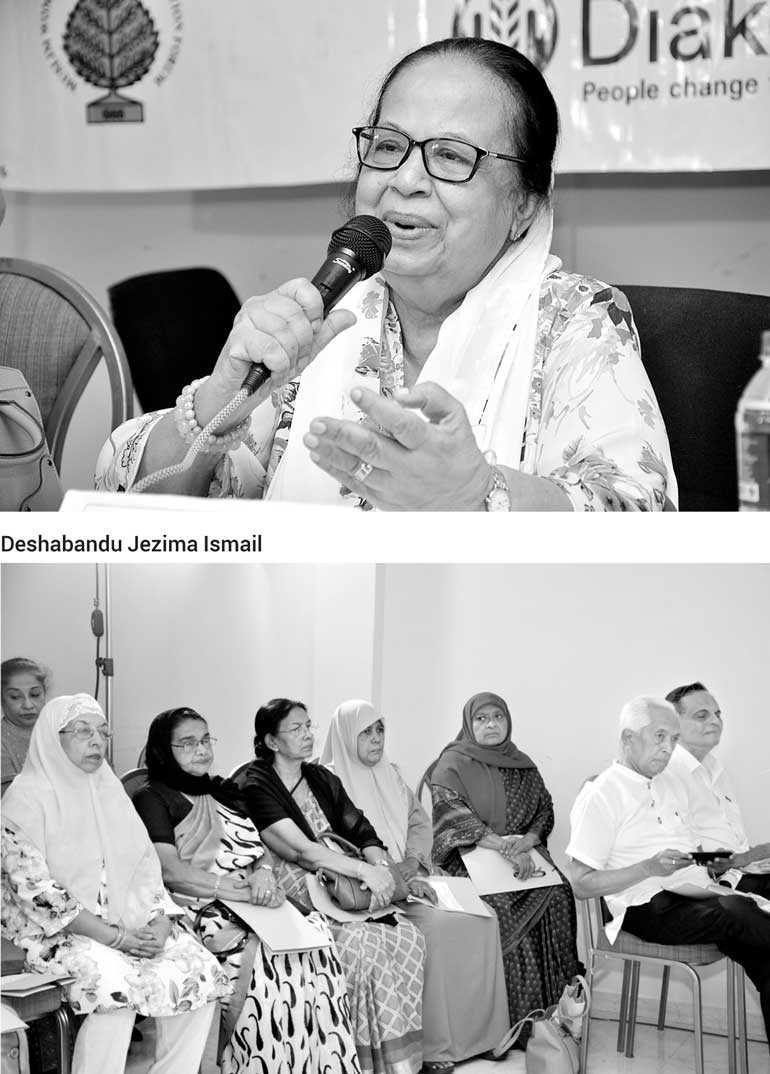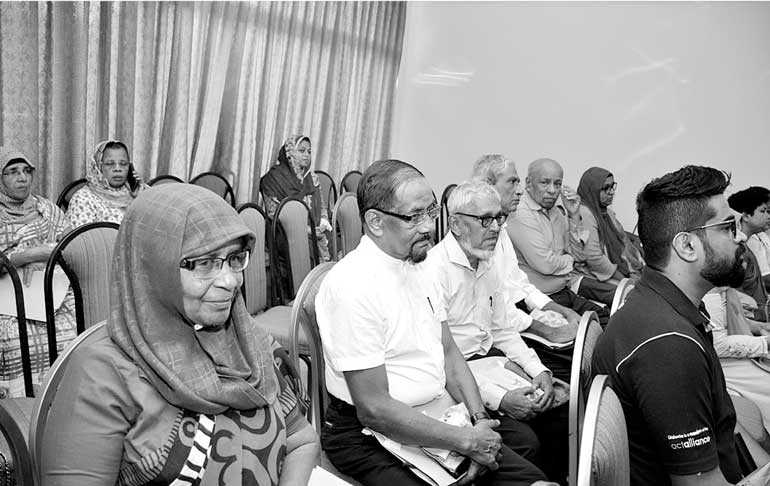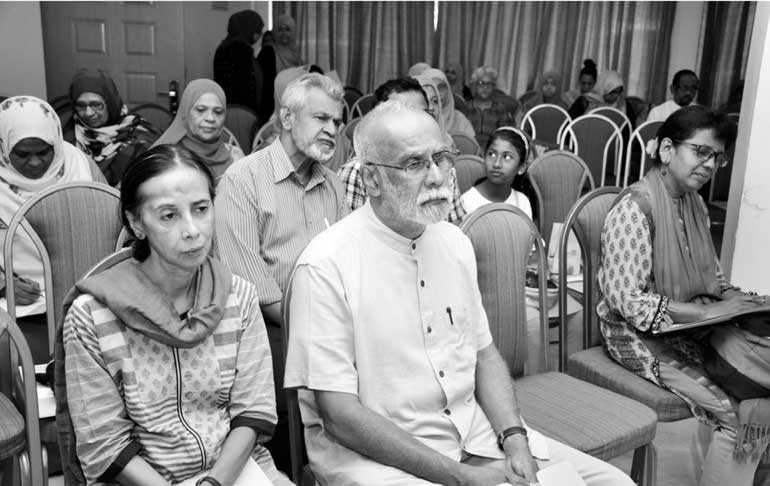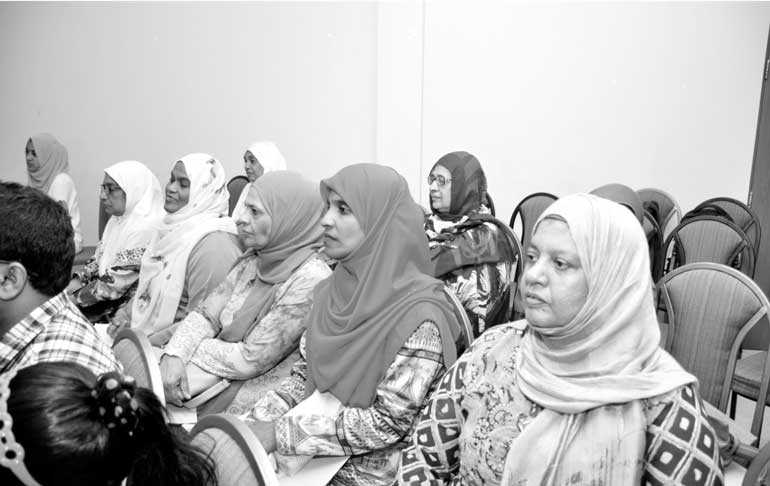Thursday Feb 19, 2026
Thursday Feb 19, 2026
Saturday, 7 September 2019 00:10 - - {{hitsCtrl.values.hits}}

by Frances Bulathsinghala
The headline that appears above was the title of the half-day public event organised by the Academy of Adult Education for Muslim Women, a Non-Governmental Organisation founded and run by the Muslims of Sri Lanka. The event was held last Sunday and commenced at about 9.30 a.m. and ended by 2 p.m. In between that time, a four-member panel addressed an audience of around 100 persons, primarily Lankan Muslims but also consisting of around a dozen non-Muslims.
Speaking to one of the organisers, it was learnt that initially at the planning stages of the event, the organising committee had wanted the event to be only for Muslims, but at the suggestion by some members had opened the event for non-Muslims. However, the success of the event was not the mere attendance of non-Muslims but that these individuals also felt comfortable enough to actively take part by asking crucial questions, including uncomfortable ones.
Some of these questions are ones which usually don’t get asked during peacebuilding seminars, which are often elitist and does nothing to encourage frank questioning, the only way authentic peacebuilding could ever be achieved. This article therefore, begins by congratulating the organisers for having made some headway towards genuine introspection among all those who attended by allowing/tolerating questions that are outside the box of complacency and nicety. Now to the proceedings of the event.
The four-member panel consisted of Deshabandu Jezima Ismail, one of Sri Lanka’s most eminent educators and social activists, Latheef Farook, an author and senior journalist who has worked in Sri Lanka and the Arab Emirates, Sheikh Muneer Mulaffar and Sheikh Rauf Zain, Islamic scholars/preachers who carry out lectures on Islam at various forums and who have appeared on several media platforms on the topics such as Islam, terrorism and current socio-religious contexts in Sri Lanka.
The event began with the playing of the national anthem and Deshabandu Jezima Ismail drew attention to the fact that Muslims of Sri Lanka are citizens of this country and not Saudi Arabia. In a brief but insightful speech, Ismail, who had taught in prestigious Sinhala as well as Muslim schools and founded the Muslim Women’s Research and Action Forum (MWRAF) spoke of the Muslims’ Lankan identity and quipped, “Someone asked me why I won’t go to Saudi, I asked, ‘For what? To go and learn Wahhabism?’”
Speaking briefly on the concept of empathy and understanding as vital components of peacebuilding, she spoke of how it is imperative to draw on the wealth of wisdom that is present in Sri Lanka in terms of diverse religious philosophies from which one could benefit greatly if one’s objective is to acquire wisdom and emotional well-being.
She explained how she personally has benefitted from being open to the rich treasures associated with Buddhism and Hinduism; mindfulness through meditation and Yoga that aligns the mind and body. She pointed out that these two forms of moulding the mind and body had helped her to deal with emotions such as extreme grief.
Detailing her conversations with some members of the Muslim community regarding her taking up practices such as Yoga and Buddhistic mindfulness, she narrated how some had asked her if she was not indulging in ‘haram’ activities. Her continuing words were indeed gems of rationality, where she pointed out that all religious philosophies have universal value, including Islam.
Whether Islamic radicalisation came first and Sinhala communalism followed, or Sinhala communalism came first and Islamic radicalisation followed as a result is something one could easily tie oneself into knots trying to figure out, as was evident during Mullafer’s comments. But what should be emphasised is that introspection should come from both the Muslims and the Sinhalese and not just one party alone
She juxtaposed the true essence of the spiritual and rationale in all philosophies and urged Muslims of Sri Lanka to deeply reflect how Islam had been hijacked in the world by those who have made it seem judgmental, rigid and parochial.
“We are definitely in a crisis situation,” Ismail warned, going onto briefly explain the deep meaning behind ‘Bismillah ir-Rahman ir-Rahim’ – a term that is core to Islam – which denotes the very essence of compassion, mercy and benevolence.
Recalling the humane relationship between Muslims and others in Sri Lanka that existed decades ago without any religious barriers, she used the term ‘Golden Age’ to describe that time which is now lost to Sri Lanka.
Her dilemma, as she pointed out, was figuring out how the current hate between communities based on religion could have ever come about to the extent of the events of 21 April. She ended her brief speech, which would not have been more than 15 minutes, with AN appeal to Muslims “not to have a victim’s attitude” and to remember that “this is the only country they have to call their own” and not Saudi Arabia. It is hoped that the Academy of Adult Education for Muslim Women would organise more similar events, allocating more time for speeches such as Ismail’s that urge introspection among Muslims.
Meanwhile, the rest of the panel members as a whole focused on a few of the aspects raised by Ismail and also spoke at length on Islamophobia, citing it as the “biggest business in the world”. Chapters of the Quran were also highlighted to explain verses that focus on peace and where it is seems otherwise, explained so that it should be understood according to the context of the time, as civilisation was at that time and place. The detailed verses of the Quran as were mentioned in the presentations are not cited in this article, but will be followed up as a separate analysis, along with interviews with the panellists.
The explanations on the Quran and the scenario all over the world with regard to Islamophobia were given in presentations by Dr. Rauff Zain and Sheikh Muneer Mullaffer.
Overall, the aim of these two persons was to portray Islam as a flexible, balanced religion as opposed to opposite views that have become entrenched today in the world. However, it was seen at times that they blamed the “Islamophobia of the world” without too much of emphasis on the actions of Muslims who pave the way and help such Islamophobia and related geo-political intrigues. “Islamic fundamentalism” was described as a term “manufactured” by Islamophobes.
In the local context, it was pointed out that “even Muslims are confused as to who are the Wahhabis and who the traditional Muslims are.” According to Dr. Rauff Zain, the popular Sri Lankan view today is that 75% are Wahhabis – followers of Muhammad ibn Abd al-Wahhab, the 18th century religious puritanist who introduced his own austere version of Islam and struck an agreement with emir Muhammed Ibn Saud to found the Saudi state.
Interestingly, Dr. Zain stated that only as few as 6% could be described as “Wahhabis” but did not elaborate in detail as merits the subject, (possibly on account of the limited time factor) on the many changes that have taken place in the minds of Muslims of Sri Lanka that is reflected in them isolating themselves from general society as seen in the East, Kattankudy in particular. On misunderstood concepts such as ‘jihad’, it was pointed out how ‘jihad’ denotes an inner struggle with ones baser self – essentially a spiritual struggle.
Zain’s speech was made in Tamil and a broad summary of it, along with detailed contextual explanations as necessary, was made by Sheikh Muneer in Sinhala. Drawing on some of the points explained by Zain, it was pointed out that Islam (as believed by Islamic scholars), extends to the first man and woman in the creation narrative of Abrahamic religions, and if a Muslim does not regard Jesus Christ as one of the prophets, he or she is not a true Muslim.
Muneer explained the need for Muslims to ponder the spiritual meaning of rituals such as the five-time prayer and to understand Islam at its inner core, opining that about 90% of Muslims may follow the outwardly-required rituals without any deep understanding of its spiritual significance. He also reminded of an incident most have forgotten today, the execution of Rizana Nafeek in Saudi Arabia on the accusation of murdering an infant in her care.
The recollection of this incident was made to describe how the Sharia law came to be viewed as a barbaric law, but an exhaustive argument was made on how punishments in Sharia are the “last resort” and that in the case of Rizana, it was only the Lankans who knew that she was 17 years when she went for employment to Saudi Arabia on a forged passport that put her age as 18.
Attempts were made to clear certain misconceptions with regard to the Quran that have heightened among non-Muslims in Sri Lanka following the 21 April terrorist attack, and it was stressed that nowhere does it say in the Quran to kill people of other faith for the mere belief in that faith. It was pointed out that freedom of faith is enshrined in the Quran and the verses on war is applicable solely to that context.
“If one takes few sentences out of the Bhagavad Gita or the Bible and bases a whole explanation of a religion these few lines, there will be serious misconstruing of the religion,” Muneer pointed out. Stereotyping Muslims as Wahhabis based on outer appearances such as long beards was also pointed out as a false understanding, with Muneer stating that he himself is looked at with diverse lenses, and given labels ranging from “Wahhabi”, “Thableeq” but also at times called “secularist.”
Meanwhile Latheef Farook, addressing the audience, recalled the prosperous country Sri Lanka was soon after independence from the British, and traced geo-political dimensions that came into play from then to now, starting with India. He spoke based on his journalistic coverage in the 1960s and 1970s in Sri Lanka Lake House, Gulf News and Khaleej Times where he covered the election campaign of Indira Gandhi. Farook in his analysis of 21 April, and the scenarios following, seemed to strongly adhere to a conspiracy theory where the entire responsibility of ownership of the mess the Muslims had gotten into (as a result of the ISIS-styled terror of Easter Sunday) was passed onto other countries.
“We must respect the head of the Catholic Church, Archbishop Malcolm Ranjith, when he said that Muslims have nothing to do with what happened on Easter Sunday, that this is part of a global conspiracy by those who manufacture arms and then talk peace and human rights,” Farook said.
It could be said that he did not fully quote the Archbishop’s speech where it was mentioned by Cardinal Ranjith that Muslims should beware from becoming pawns in the net of global conspiracies and did not entirely exclude the Muslims from the equation, as it is nine Lankan Muslims who blew themselves up. Thwarted and twisted though their understanding of Islam may have been, the fact remains that they were Lankan Muslims and not Americans or Israelis or even Saudis.
According to Farook, the 21 April incident was an orchestrated opportunistic event, “to drill fear into the hearts and minds of Muslims in Sri Lanka.” The ensuing search operations that ensued in Sri Lanka had some Muslims burning the Quran out of fear, Farook alleged, repeatedly mentioning America, Israel and Saudi Arabia as the global ‘conspirators’ and stating that there was an ‘Israel presence’ in Sri Lanka.
“What was the need to search all Muslims in Sri Lanka and drive fear into their hearts? What should have happened after 21 April was arrest Zahran’s supporters and leave innocent Muslims alone,” Farook said.
Later, taking up questions, Farook and Dr. Zain as well as Mullafer was asked by this writer whether their stance was not an overtly simplistic and defensive, which does nothing to encourage Lankan Muslims to acknowledge that it was nine Muslims who carried out the dastardly attack on 21 April, and whether or not the conspiracy theories may be true, it would not have been possible to fulfil them if Lankan Muslims had not fallen prey to them.



In attempting to answer the question and pointing to the anti-Muslim events that occurred in Sri Lanka in the years prior to April this year, Muneer Mullafer avoided the use of the word ‘Muslim’ and referred to those who carried out the Easter Sunday attack as ‘Sri Lankans’, pointing out that there were many aspects that should be looked into. Overall, the impression from listening to Mullafer was that the events that occurred on 21 April was linked to a kind of repercussion of the anti-Muslim actions that culminated in riots in 2014 and 2018. But the major flaw in this analysis is that the people brutally killed were Sri Lankan Christians who had never been involved in anti-Muslim propaganda.
At the point Mullafer referred to events prior to the April attacks, this writer who had interviewed the BBS General Secretary for a foreign publication (which is online from Sunday), made a reference to 30-odd Sinhala language publications/small booklets with Middle Eastern addresses shown by the BBS office, that pointed to a conversion drive as well as hate-based aggressive assertion of Islam, propagating it as the only truth and vilifying and insulting all other religious philosophies.
Whether Islamic radicalisation came first and Sinhala communalism followed, or Sinhala communalism came first and Islamic radicalisation followed as a result is something one could easily tie oneself into knots trying to figure out, as was evident during Mullafer’s comments. But what should be emphasised is that introspection should come from both the Muslims and the Sinhalese and not just one party alone.
Reverting to the aim of peacebuilding that was the purpose of the seminar, the platform it gave for a majority of questions from non-Muslims could be cited as a very positive aspect, given that peacebuilding ideally involves a constant evolution of the mindset to the point where ‘enemies’ or those termed ‘racists’ are no longer such, so that there is a tangible result of all peacebuilding seminars.
Among the other opinions and questions expressed were the persecution of those such as the Sufis in Sri Lanka and Ahmadiyyas elsewhere, and who is really responsible for Muslim youth in a background where they are leaving Islam. The lady who asked the latter question is a Muslim entrepreneur who works with youth and who had interviewed those who call themselves ‘ex-Muslims’ of Sri Lanka.
She pointed to factors cited by those who belonged to this group for leaving Islam that ranged from strict regulations of their life by their families (in the name of Islam), not having the choice whether to choose to wear the hijab or not and such issues. She also made a pointed reference that she does not wear the hijab as a personal choice and wanted to know more about how tolerance within Islam could be put to practice to prevent its youth veering to either one of the two extremes of religiosity or non-religiosity. In the answers given it was explained that there is a need to work practically to dispel wrong views and that the organisers are planning more seminars in this regard.
Deshabandu Jezima Ismail juxtaposed the true essence of the spiritual and rationale in all philosophies and urged Muslims of Sri Lanka to deeply reflect how Islam had been hijacked in the world by those who have made it seem judgmental, rigid and parochial. “We are definitely in a crisis situation,” Ismail warned, going onto briefly explain the deep meaning behind ‘Bismillah ir-Rahman ir-Rahim’ – a term that is core to Islam – which denotes the very essence of compassion, mercy and benevolence. Recalling the humane relationship between Muslims and others in Sri Lanka that existed decades ago without any religious barriers, she used the term ‘Golden Age’ to describe that time which is now lost to Sri Lanka
There was also a warm-hearted calling by a Sinhalese who urged Muslims “to interact more with the Sinhalese” and not isolate themselves.
In this respect, Muneer Mullafer, who lives in a fully Sinhala rural village, revealed that he eats at the village kiosk, being well aware in Islamic terms of what is halal and haram. He explained that he had no need to fear that the food in the village Sinhala ‘kade’ was haram and knew that there was no need to raise a major hue and cry about food being halal as occurred in Sri Lanka, where Sinhala business persons had to for the first time in history pay officers of the Halal Committee to check if the food was Halal or not, and as a result paved the way for the Bodu Bala Sena (BBS) to come into the limelight. Mullafer seemed to have a strong grasp of the Buddhist philosophy in its true essence as preached by the Buddha and his cross-cultural sensitivity seemed very profound.
“My mother has always worn saree, and I have lived all my life among the Sinhalese, practicing my religion the way it should be practiced, so that peace is given the highest priority and I have had no issues or cultural conflicts with them. I know that when I invite them for a meal what I should serve them. I do not serve them beef and they also know what should not be served to me.”
Overall, the sum up was not to make a fetish of a religion to the point of alienation that makes a community resent another culture.
A question was also asked by a non-Muslim on mixed marriages with Muslims. Mullafer acknowledging that love is often ‘blind’, said that in a practical and overall sense it helps when both parties belong to one religious group as it has impact on many culturally-indoctrinated daily practices that includes diet.
In ending this article on account of space, it should be said that in terms of the audience which were around 90% Muslim, there were mixed reactions to some of the questions asked. However, in general it seemed that more events of this nature should be organised so that that genuine discussions take place instead of silence or mere defensive stances that look at outside influences on which to direct blame, resulting in a volcanic complacency that created the shocking events of Easter Sunday.
It must also be mentioned that such discussions should not be a one-off event, cramped in terms of time, but interweaving ones which focus on understanding the full spectrum of a phenomena connected with community unrest. This is needed to merit the terminology ‘peacebuilding.’
It is heartening to hear from the organisers that they are following up with more such events in the immediate future, including in the provinces where such discussions are more needed than in Colombo.
Pix by Lasantha Kumara
Peacebuilding